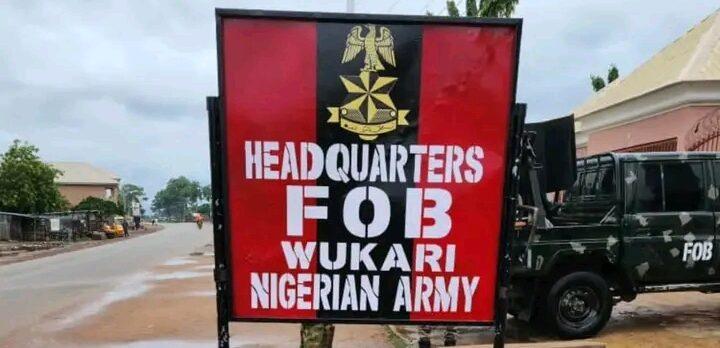The Nigerian Army has inaugurated a new Forward Operating Base (FOB) in Wukari Local Government Area, in Southern Taraba, marking a major milestone in efforts to curb banditry, terrorism, and other security threats in the region.
The facility was formally launched on Wednesday by the Commander of 6 Brigade and Sector 3 of Operation Whirl Stroke (OPWS), Brigadier General Kingsley Chidiebere Uwa, who emphasized the importance of the new base in improving rapid response operations and maintaining a strong military presence in volatile areas.
Addressing the troops at the commissioning ceremony, Brigadier General Uwa described the FOB as a strategic asset in the Army’s campaign to stabilize conflict-prone communities and dismantle criminal networks operating in Southern Taraba. He urged soldiers stationed at the base to dominate their area of responsibility and ensure that no safe haven remains for terrorists, bandits, or other criminal actors.
“The fight against insecurity must be relentless. The establishment of this base means troops can respond faster, act more decisively, and protect the people with greater efficiency,” Uwa said, while calling on the soldiers to remain vigilant, professional, and committed to safeguarding both lives and national infrastructure.
Related Articles:
- Nigerian Army to sponsor children of fallen Soldiers for 2024/2025 Academic Session
- Nigerian Army General lauds troops for boosting Oil production in the Niger Delta
- Nigerian Army arrests four ambazonia rebel suspects in Taraba State
As part of confidence-building efforts, the Brigade Commander led troops on a patrol across Wukari town and its neighboring villages, reassuring residents of the Army’s readiness to provide continued protection and proactive engagement. The patrol, according to military sources, is part of a broader mission to improve civil-military relations and rebuild trust in government security institutions.
The Wukari FOB is one of several forward bases being established across Nigeria’s hotspots under the current national security strategy aimed at decentralizing military presence, improving intelligence gathering, and strengthening real-time operational capabilities.
Local leaders and community stakeholders have applauded the development, describing it as a long-overdue intervention that will bring lasting peace and stability to an area frequently plagued by armed violence. Residents expressed renewed hope that with the Army’s stronger presence, normalcy will return to their communities, allowing economic and social activities to thrive once again.
